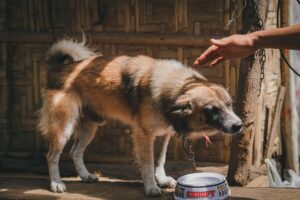Dalmatian is a breed of dog that originated in Croatia, on the eastern shore of the Adriatic Sea. Dalmatians are best known for their distinctive black or liver-colored spots on white coats.
They are a medium-sized breed, with a muscular and athletic build, making them well-suited for various activities such as running, jogging, and hiking.
Dalmatians have a friendly, outgoing, and energetic personalities, and they are often considered good family pets. They are intelligent and trainable, but they can be stubborn at times and may require patience and consistency in their training.
In popular culture, Dalmatians are often associated with firehouses and firefighting, due to their historical use as firefighting dogs.
They were bred to run alongside horse-drawn fire engines, clearing a path for the horses and firefighters, and protecting the equipment.
Today, Dalmatians are still popular as family pets and are recognized by the American Kennel Club as a member of the Non-Sporting Group.

Table of Contents
ToggleInteresting Facts about the Dalmatian Breed
Here are some interesting facts about the Dalmatian breed:
- Dalmatians were originally bred as coaching dogs in England, where they would run alongside horse-drawn carriages to protect the horses and the occupants from other dogs and bandits.
- Dalmatians are excellent watchdogs and protectors. They are known for their loyalty and courage, and will bark to alert their owners of any potential danger.
- Dalmatians are one of the oldest dog breeds, with a history that dates back to the 1600s.
- Dalmatians are born completely white, and their spots develop as they mature. The number and size of the spots can vary widely between individuals.
- Dalmatians have a unique liver-colored pigment that gives their spots their distinctive black or liver color.
- Dalmatians have excellent hearing and a high pain tolerance, making them well-suited for use as hearing dogs for the deaf and as search and rescue dogs.
- Dalmatians have been featured in several popular movies and books, including the Disney classic “101 Dalmatians.”
- Dalmatians are prone to a genetic condition called deafness, which can affect up to 20% of the breed. This can be prevented through responsible breeding practices.
- Dalmatians are high-energy dogs that require plenty of exercise and mental stimulation to stay happy and healthy.
- Dalmatians are known for their strong bond with their owners and make excellent family pets for those who can provide them with the exercise and attention they need.
Common Health Issues of Dalmatian Dogs
Dalmatians, like all dog breeds, are prone to certain health issues. Some of the most common health concerns in the breed include:
Deafness:
Dalmatians are prone to hereditary deafness, which can affect up to 20% of the breed. Deafness can occur in one or both ears and is caused by a lack of pigment in the inner ear. It can also be caused by a genetic predisposition to the condition.
Urinary Stones:
Dalmatians are also prone to the formation of urinary stones, which can cause blockages and infections in the urinary tract. These stones are often composed of calcium oxalate, and can be prevented through proper diet and hydration.
Allergies:
Dalmatians are prone to skin allergies, which can cause itching, scratching, and hair loss. Allergies can be caused by environmental allergens, such as pollen or dust mites, or by food sensitivities.
Hip Dysplasia:
This is a common genetic condition in which the hip joint does not develop properly, leading to arthritis and pain in the affected joint. This condition can be managed with medication and weight management, but it is important to have affected dogs examined by a veterinarian regularly.
Eye Problems:
Dalmatians are prone to a number of eye problems, including cataracts, progressive retinal atrophy, and corneal ulcers. Regular eye exams by a veterinarian can help detect these issues early and prevent vision loss.
It’s important to note that not all Dalmatians will develop these health issues, but it is important to be aware of the potential risks. Regular visits to the vet and a balanced diet can help to prevent many of these health concerns.
Additionally, purchasing a Dalmatian from a reputable breeder who has performed health screenings on their breeding dogs can help to reduce the risk of these conditions.

![The Ultimate Guide to Road Tripping with Your Dog [2025 Update]](https://bellabeanupdate.com/wp-content/uploads/2025/05/pexels-photo-1143369-300x209.jpeg)





























